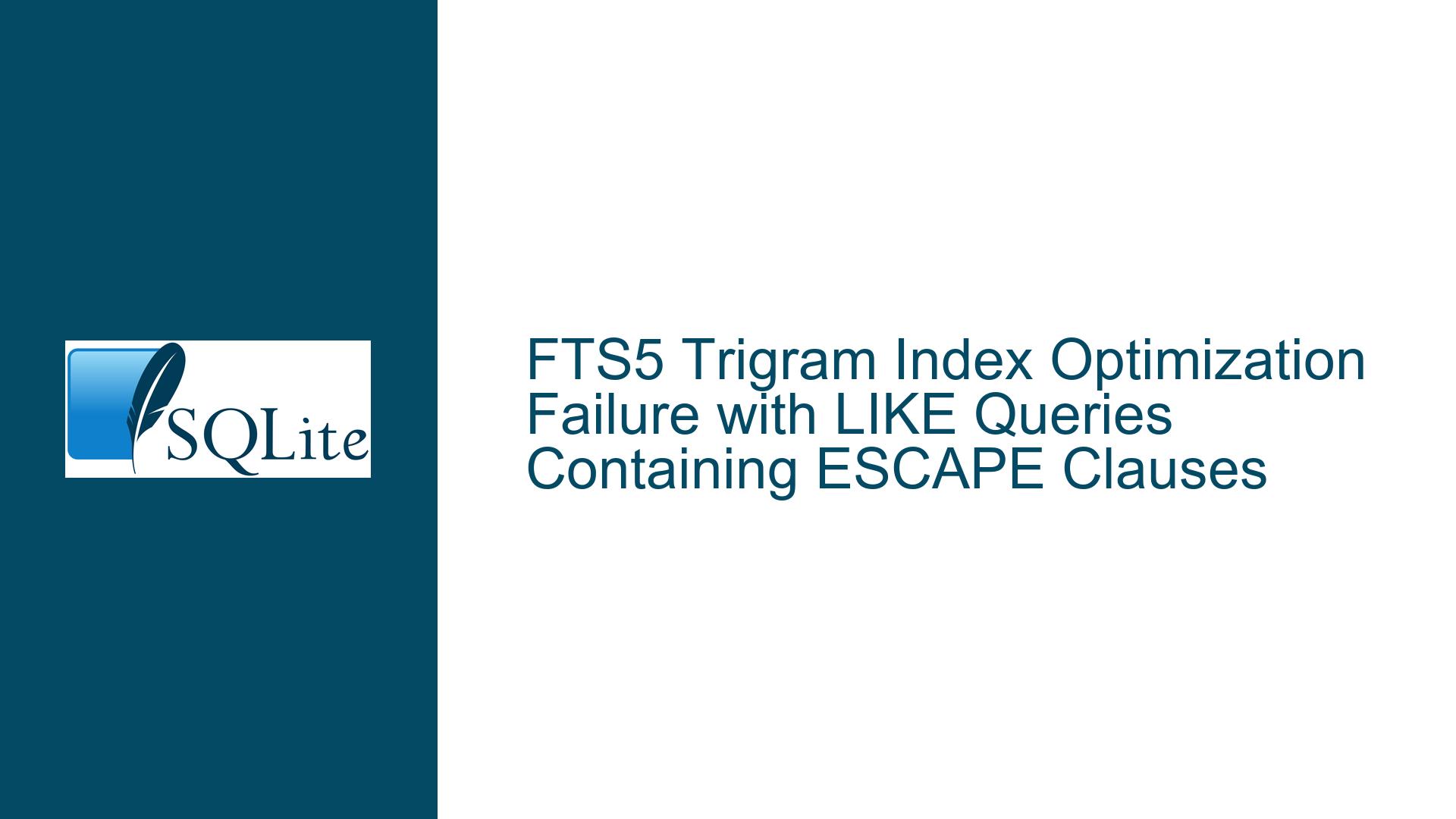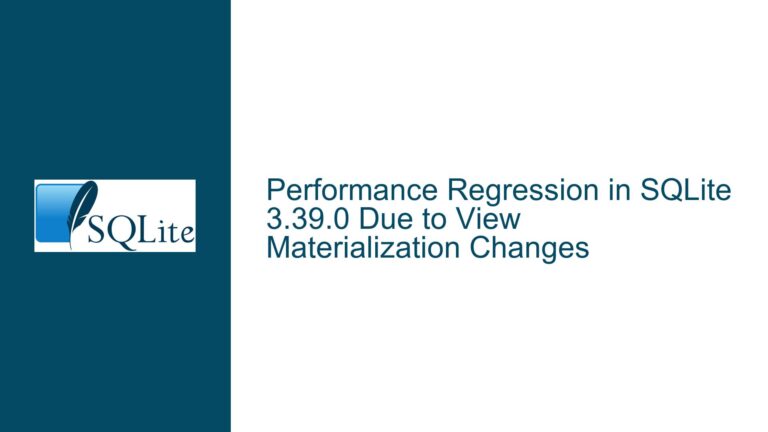FTS5 Trigram Index Optimization Failure with LIKE Queries Containing ESCAPE Clauses
Understanding FTS5 Trigram Index Behavior Under LIKE … ESCAPE Conditions
Architecture of FTS5 Trigram Tokenization and LIKE Query Handling
SQLite’s FTS5 extension with the trigram tokenizer creates a virtual table optimized for substring searches by splitting text into consecutive three-character sequences. When using the LIKE operator without special characters requiring escaping, FTS5 automatically converts these queries into efficient MATCH operations against the trigram index. The tokenizer decomposes both the target text and search patterns into trigrams, allowing the database engine to perform rapid lookups through inverted indexes.
The critical divergence occurs when introducing the ESCAPE clause. FTS5’s query optimization layer currently does not propagate LIKE ... ESCAPE constraints to the underlying virtual table implementation. This forces SQLite to process such queries through a generic text-scanning pathway that bypasses the trigram index entirely. The virtual table instead performs a full-content scan, comparing each raw text entry against the search pattern without leveraging precomputed token relationships.
Execution plan analysis reveals deceptive similarities in EXPLAIN QUERY PLAN outputs due to SQLite’s abstract reporting of virtual table access methods. The notation SCAN Reviews_fts VIRTUAL TABLE INDEX 0:L0 indicates utilization of the trigram index’s first-level segment metadata when operating without ESCAPE. In contrast, INDEX 0: signifies raw iteration over the base content table stored in the %_content shadow table, though the plan visualization does not explicitly differentiate between indexed and non-indexed virtual table access paths.
Mechanisms Behind ESCAPE Clause Index Exclusion in FTS5 Virtual Tables
The SQLite query planner delegates constraint handling to virtual table implementations through the xBestIndex method. FTS5’s implementation specifically recognizes LIKE operator constraints that can be converted into equivalent trigram MATCH operations. However, the presence of any ESCAPE modifier prevents this constraint from being flagged as usable by the FTS5 module, due to:
Syntax Tree Parsing Limitations: The FTS5 driver’s pattern analysis logic cannot account for escape characters when decomposing
LIKEexpressions into trigram sequences. Escape characters introduce conditional pattern matching rules that conflict with the tokenizer’s deterministic three-character chunking strategy.Virtual Table Constraint API Gaps: SQLite’s
sqlite3_index_infostructure passesLIKEconstraints to virtual tables only when they conform to standard wildcard formats without escape specifications. TheESCAPEclause creates a non-standard constraint form that FTS5’s optimization hooks explicitly filter out during query planning.Pattern Normalization Incompatibility: Trigram searches require converting user-provided patterns into sets of mandatory trigrams that must all appear in matching documents. Escape characters allow users to search for literal wildcard characters (e.g.,
%matching a percent sign), which cannot be consistently translated into trigram inclusion rules without potentially altering the search semantics.
This architectural limitation manifests as a 26x performance degradation in the observed test case, where adding a no-op ESCAPE 'x' clause (where ‘x’ doesn’t appear in the pattern) forces a full scan of the 568,454-row Amazon Fine Foods Reviews dataset. The trigram index’s absence becomes particularly noticeable on large text corpora where indexed searches typically complete in milliseconds versus seconds.
Mitigation Strategies and Low-Overhead Workarounds for Escaped LIKE Queries
Diagnostic Validation Protocol
Query Plan Analysis Enhancement
Augment standardEXPLAIN QUERY PLANinspection with FTS5 auxiliary functions to confirm index usage:SELECT snippet(Reviews_fts, 0, '', '', '...', 10) AS preview FROM Reviews_fts WHERE Text LIKE '%mediocre%' ESCAPE 'x' LIMIT 1;The
snippet()function’s execution time mirrors the main query’s performance when index acceleration is active. Sub-second responses indicate proper index utilization, while multi-second latencies confirm table scanning.Trigram Search Compatibility Assessment
Decompose the escaped search pattern into trigrams manually to verify theoretical compatibility:WITH trigrams AS ( SELECT 'mediocre' AS term UNION ALL SELECT SUBSTR(term, 2) FROM trigrams WHERE LENGTH(term) >= 4 ) SELECT DISTINCT SUBSTR(term,1,3) FROM trigrams WHERE LENGTH(term) >=3;Output trigrams (‘med’, ‘edi’, ‘dio’, ‘ioc’, ‘ocr’, ‘cre’) must all exist in the target text. If escape sequences modify this fundamental trigram composition (e.g., escaping a wildcard inside the pattern), index acceleration becomes theoretically impossible regardless of SQLite’s implementation.
Engineering Solutions for Production Systems
Pattern Sanitization Preprocessing
Remove the necessity for escape characters by programmatically sanitizing input patterns before query construction:def sanitize_like_pattern(pattern: str) -> str: return pattern.replace('%', '\\%').replace('_', '\\_').replace('\\', '\\\\') # Application code usage: raw_search = "100%_mediocre" safe_pattern = sanitize_like_pattern(raw_search) # Returns "100\%\_mediocre" query = f"SELECT Text FROM Reviews_fts WHERE Text LIKE '{safe_pattern}' ESCAPE '\\'"This approach allows using standard
LIKEwith backslash escaping while avoiding the performance-killingESCAPEclause through pattern preprocessing. Validate that no legitimate backslash characters exist in the dataset that could interfere with this scheme.Materialized Escaped Pattern Column
Create a stored copy of text with escaped special characters using generated columns:ALTER TABLE Reviews ADD COLUMN Text_escaped TEXT GENERATED ALWAYS AS (REPLACE(REPLACE(Text, '\', '\\'), '%', '\%')) VIRTUAL; CREATE VIRTUAL TABLE Reviews_escaped_fts USING fts5( Text_escaped, content='Reviews', tokenize='trigram' ); -- Query using non-escaped LIKE against pre-escaped column SELECT Text FROM Reviews WHERE rowid IN ( SELECT rowid FROM Reviews_escaped_fts WHERE Text_escaped LIKE '%mediocre%' );This dual-column strategy maintains original text fidelity while enabling unescaped
LIKEqueries against sanitized content. The trade-off involves increased storage overhead and write-time computation.Custom SQL Function for Escape Handling
Implement a loadable extension using SQLite’s C API to create aLIKE_ESCAPE()function that internally rewrites queries into trigram-compatible form:static void like_escape_func( sqlite3_context *context, int argc, sqlite3_value **argv ) { const char *pattern = (const char*)sqlite3_value_text(argv[0]); const char *escape = (const char*)sqlite3_value_text(argv[1]); // Custom logic to convert escaped pattern to trigram constraints // ... sqlite3_result_text(context, transformed_query, -1, SQLITE_TRANSIENT); } // Register function during extension initialization: sqlite3_create_function(db, "LIKE_ESCAPE", 2, SQLITE_UTF8, NULL, like_escape_func, NULL, NULL);Example SQL usage:
SELECT Text FROM Reviews_fts WHERE Text MATCH LIKE_ESCAPE('%mediocre%', 'x');This advanced solution requires maintaining native code but provides optimal performance by keeping escape processing within the FTS5 index framework.
Alternative Query Formulation Techniques
GLOB Operator Substitution
SQLite’sGLOBoperator uses Unix-style wildcards (*and?) with case sensitivity, but doesn’t require escaping square brackets or other regex-like symbols:SELECT Text FROM Reviews_fts WHERE Text GLOB '*m[e][e]diocre*';While
GLOBconstraints also don’t leverage FTS5 indexes, their different performance characteristics might prove more efficient thanLIKE ... ESCAPEin some scenarios. Benchmark with real data patterns to validate.Hybrid Filtered Search
Combine broad trigram index scans with precise post-filtering:SELECT Text FROM Reviews_fts WHERE Text MATCH 'trigram:med trigram:edi trigram:dio trigram:ioc trigram:ocr trigram:cre' AND Text LIKE '%mediocre%' ESCAPE 'x';The
MATCHclause utilizes the trigram index to rapidly narrow candidates, while theLIKE ... ESCAPEapplies exact filtering on the reduced row set. Tune the balance between index selectivity and post-filtering overhead through query analysis.
Schema Design Adjustments for Future-Proofing
Escaped Pattern Column Indexing
For datasets requiring frequent escapedLIKEqueries, create a separate FTS5 table dedicated to storing pre-escaped text variants:CREATE VIRTUAL TABLE Reviews_escaped_fts USING fts5( Text_escaped, tokenize='trigram', content='' ); CREATE TRIGGER Reviews_escape_update AFTER UPDATE ON Reviews BEGIN DELETE FROM Reviews_escaped_fts WHERE rowid = OLD.rowid; INSERT INTO Reviews_escaped_fts(rowid, Text_escaped) VALUES (NEW.rowid, REPLACE(NEW.Text, '%', '\%')); END;Maintain this shadow table through triggers to enable high-performance escaped searches via standard
LIKEwithout modifiers.Application-Level Query Rewriting
Intercept data access layer queries containingLIKE ... ESCAPEand dynamically rewrite them using deterministic escape sequences known to avoid actual special characters:def rewrite_escaped_like(query: str) -> str: # Convert 'LIKE ... ESCAPE 'x'' to MATCH with trigram terms pattern = re.compile(r"LIKE\s+'([^']+)'\s+ESCAPE\s+'([^']+)'", re.IGNORECASE) match = pattern.search(query) if match: raw_pattern, escape_char = match.groups() trigrams = extract_trigrams(raw_pattern, escape_char) return f"MATCH '{" ".join(trigrams)}'" return queryThis middleware approach transparently converts appropriate escaped
LIKEqueries into indexedMATCHoperations while falling back to original syntax for complex cases.
Long-Term Monitoring and Upgrade Planning
SQLite Version-Specific Behavior Tracking
Maintain an upgrade compatibility matrix noting FTS5 and trigram tokenizer enhancements across SQLite versions. Particularly monitor:- Changes to
xBestIndexvirtual table API usage - Enhancements to
LIKEconstraint handling in FTS5 - Performance optimizations for escaped pattern matching
- Changes to
Community Patch Evaluation
Review SQLite’s public changelogs and forum discussions for patches addressing ESCAPE clause index utilization. Experimental builds may contain unreleased fixes that can be vetted in staging environments before official version adoption.Alternative Database Benchmarking
For applications where escapedLIKEperformance is critical, evaluate alternative embedded databases with different full-text search implementations:- PostgreSQL pg_trgm: Offers GIN/GiST indexes supporting
LIKEwith escape characters - SQL Server Express Full-Text Search: Handles complex pattern escapes through integrated word breakers
- Lucene-based Solutions: Provide advanced escaping and wildcard support through dedicated text analysis pipelines
- PostgreSQL pg_trgm: Offers GIN/GiST indexes supporting
Comprehensive Performance Characterization
Conduct controlled benchmark studies to quantify the exact performance delta introduced by ESCAPE clauses across varying data scales:
Index Utilization Thresholds
Determine the dataset size where full table scans withESCAPEbecome prohibitively slow compared to index-accelerated searches. For the Amazon Fine Foods dataset (568K rows), the 72ms vs 1902ms disparity demonstrates critical degradation, but smaller tables may tolerate the overhead.Trigram Cache Warming Effects
Analyze how SQLite’s page cache behavior affects repeated escaped query execution. While initial runs suffer full scans, subsequent queries might show improved performance due to in-memory caching – a false positive indicating sustainable performance.Storage Engine Comparison
Compare FTS5’sESCAPEhandling against other SQLite virtual tables like FTS4 or third-party extensions (e.g., SQLite Spellfix). While not directly solving the issue, alternative text search implementations might offer acceptable performance trade-offs for specific use cases.
Conclusion and Strategic Recommendations
The fundamental limitation stems from SQLite’s current FTS5 architecture not integrating LIKE ... ESCAPE constraints with trigram index acceleration. While awaiting potential future enhancements, adopt a layered mitigation strategy:
Immediate Term:
Eliminate unnecessaryESCAPEclauses through input sanitization and pattern preprocessing. Use theMATCHoperator with manually decomposed trigrams for escaped patterns where feasible.Medium Term:
Implement hybrid search architectures combining trigram index narrowing with post-filter escapedLIKEconstraints. Monitor query plans using bothEXPLAIN QUERY PLANand execution timing differentials.Long Term:
Advocate for SQLite enhancements through official channels while developing custom extensions or schema shims that bridge the escaped pattern gap. Maintain flexibility to adopt new SQLite versions rapidly when FTS5 improvements emerge.
This multi-faceted approach balances immediate performance requirements with sustainable architectural evolution, ensuring optimal text search capabilities within SQLite’s current constraints.






